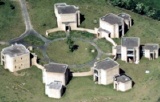Summer School on Computational Neuroscience and Gene Circuits
Organisers: Feng Jianfeng (Warwick), Markus Kirkilionis (Warwick), Lin Wei (Shanghai)

Mathematics Institute, University of Warwick, 3 -7 July 2009Zeeman Building, Room MS.03, The Street (Saturday, Sunday) and Complexity DTC, Room D1.07 (Friday, Monday, Tuesday)
Aims:
The first aim was to explore the current experimental and theoretical understanding of neuronal function (including both the single cell level and neuronal networks) and the influence on/of genetic regulation. We explored experimental techniques like imaging and genetic manipulation in all their different aspects. On the computational level we discussed the use of computing techniques and how this can support and explain phenomena in the interface of genetic regulation and neuronal behaviour, from image analysis to sophisticated simulation approaches.
Programme: Friday, 3rd July, Saturday 4th July, Sunday 5th July, Monday 6th July, Tuesday 7th July.
The workshop incorporated a summer school for students each morning. The afternoons had been reserved for scientific talks.
Background: Computational neuroscience is a relatively mature area in computational biology. For example, the Hodgkin-Huxley model was proposed in 1952 describing the generation of action potential and the activities of potassium and sodium channels. The Hodgkin-Huxley is probably the most well known and successful model in system biology. It captures the essential features of the biological system at multiple spatial-temporal scales, from membrane currents, protein and chemical coupling to network oscillations, columnar and topographic architecture and finally learning and memory. These computational models are used to test hypotheses that can be directly verified by current or future biological experiments.


In general, computational neuroscience has played an important role in modelling cognitive neuroscience. However, we only have very few models bridging the gap between genes, proteins and neuronal activity. Our summer school is trying to bring the two areas together: computational neuroscience and computational molecular biology. The workshop aims at training the young generation to work on this cross-over.
Sponsered by Warwick IAS
|
|
See also:
Mathematics Research Centre
Mathematical Interdisciplinary Research at Warwick (MIR@W)
Past Events
Past Symposia
Where possible, visitors should obtain an EDUROAM account from their own university to enable internet access whilst at Warwick.
You can register for any of the symposia or workshops online. To see which registrations are currently open and to submit a registration, please click hereLink opens in a new window.
Mathematics Research Centre
Zeeman Building
University of Warwick
Coventry CV4 7AL - UK
E-mail:
MRC@warwick.ac.uk


